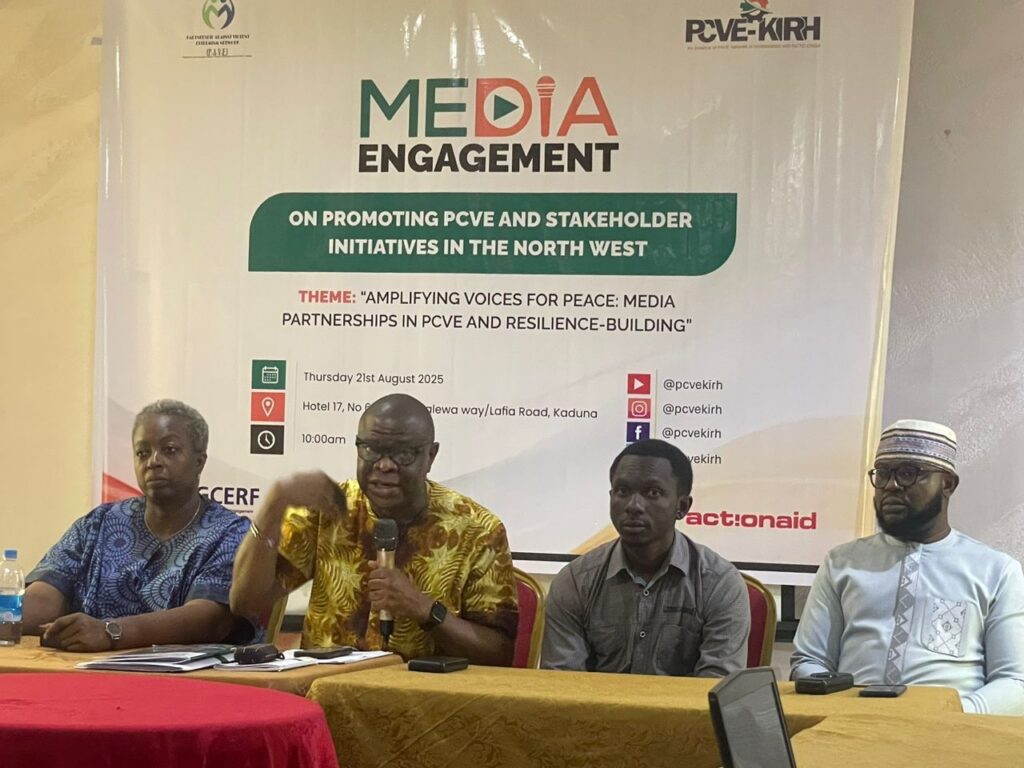A Non-Governmental Organisation, Partnership Against Violent Extremism (PAVE) Network in Nigeria, has said the spread of violent extremism in the North-West is largely driven by years of poor governance, deepening poverty, and unresolved historical grievances.
The Chairman of PAVE’s National Steering Committee, Jaye Gaskiya, made this remark on Thursday in Kaduna during a one-day media engagement on Preventing and Countering Violent Extremism (PCVE) and stakeholders’ initiatives in the region.
Gaskiya stressed that insecurity in the North-West would persist unless state and Local Governments urgently addressed systemic failures in governance and accountability.
Jointly organised with the Office of the National Security Adviser (NSA) and ActionAid Nigeria, and supported by the Global Community Engagement and Resilience Fund, the session brought together journalists and civil society representatives from the region.
Titled “Amplifying Voices for Peace: Media Partnerships in PCVE and Resilience-Building,” Gaskiya said extremist groups take advantage of citizens’ frustrations, especially among young people who feel excluded and disconnected from governance structures.
READ ALSO
“At the base of this crisis, really, the reason why violent extremist groups and leaders gain support and are able to mobilise teeming masses of people into their ranks can essentially be traced back to the failure of governance and dysfunctional governance,” he said
He highlighted widespread poverty, deepening inequality, the collapse of the education system, and lingering communal disputes as major factors fueling violent extremism in the region.
“You have rampant poverty, inequality, historical grievances between communities that have not been addressed, failure of the education system, and children being raised with no sense of the future. All that is needed is a charismatic leader to emerge and mobilise them.”
Gaskiya explained that the forum sought to strengthen ties between journalists and civic groups in shaping public discourse, improving understanding of insecurity, and jointly developing solutions to build resilience in at-risk communities.
“What we have done is to try to promote a relationship between the media and civil society, particularly on the question of addressing violent extremism. We want a symbiotic relationship where there is a deeper understanding, informed reporting, and co-creation of solutions.”
He emphasised that tackling violent extremism must start with stronger grassroots governance.
According to him, restoring full autonomy to local governments, ensuring credible council elections, and giving communities greater control over peacebuilding initiatives are crucial steps toward lasting security.
“We are advocating for reforming and enabling local governance, strengthening local governments, and ensuring local government autonomy.
“All of us must become more interested in our state electoral laws and how elections into local government councils are held, so that credible persons can emerge in those authorities.”
The Chairman further cautioned that partisan rivalries were weakening joint efforts against insecurity, stressing that security issues should be treated above politics.
“Security should be non-partisan. Regardless of political affiliation, governments and leaders must work together. We need synergy between national, state, and local action plans.”
He further commended the commitment of security forces but maintained that military action by itself was insufficient to defeat violent extremism and advised state authorities to focus more on providing employment opportunities, quality education, healthcare, and decent housing, emphasising that such measures were critical to reducing the pool of vulnerable youths lured by extremist groups.
“If our approach is simply law enforcement – deploy the police, deploy the military – but people still cannot get jobs, cannot be educated, cannot access healthcare or decent housing, then we are not addressing the problem. We are simply wasting money on law enforcement.”
Emphasising the importance of the media, he noted that accurate and sensitive journalism was vital in shaping narratives on insecurity, guiding public perception, and spotlighting pathways to peace rather than merely magnifying violence.
“We need better management of communication and the flow of knowledge around these issues. This requires effective partnerships, particularly between civil society and the media.”















